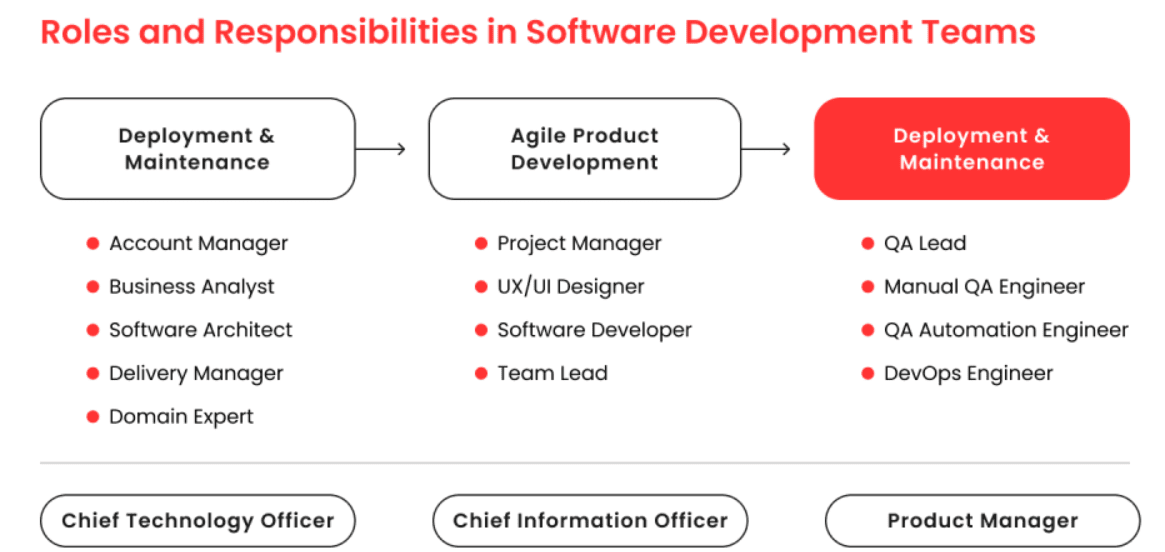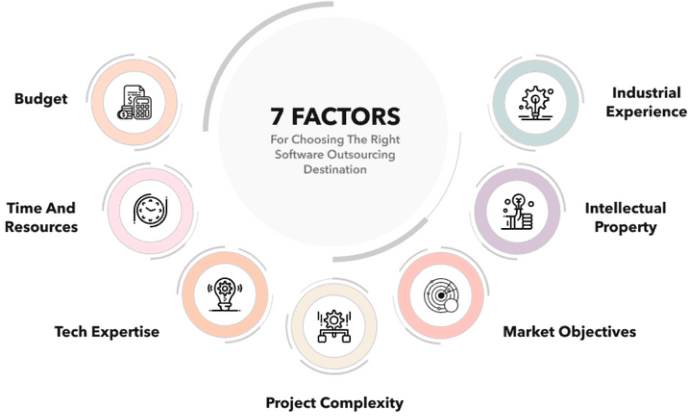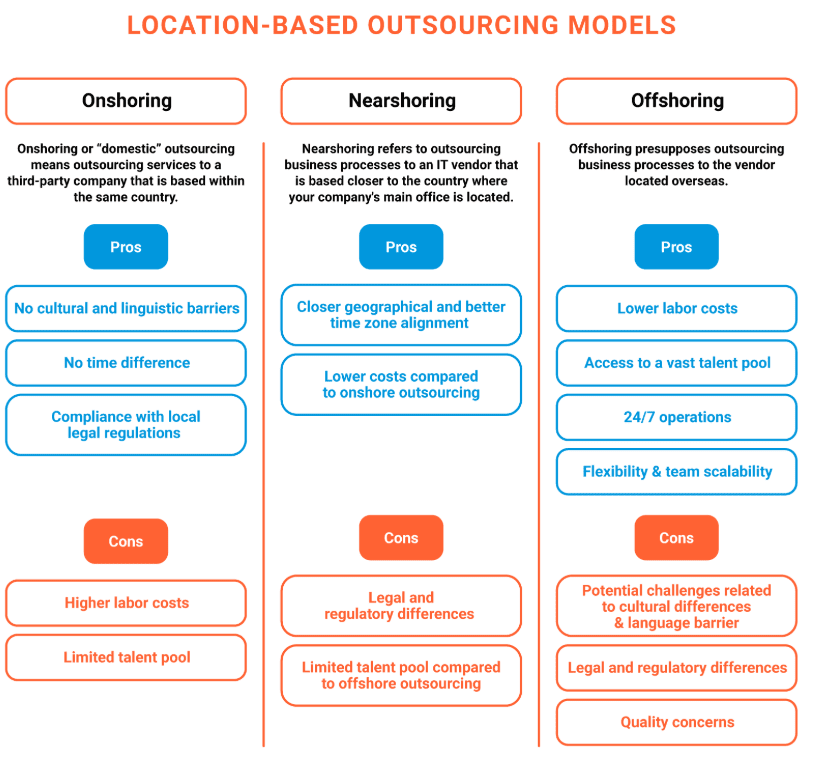Software development outsourcing involves contracting out software development tasks or projects to external providers, often located in different geographical regions. This practice has become increasingly prevalent as businesses seek to leverage global talent, reduce costs, and accelerate development cycles. This article aims to provide a comprehensive overview of the common roles and processes that software development firms outsource. It will explore the benefits, challenges, and best practices associated with software development outsourcing, providing insights for businesses seeking to optimize their development efforts.
Common Outsourced Processes in Software Development
Software Testing and QA
For US business owners, outsourcing software testing and QA is not just about cost reduction; it's about ensuring their products meet the highest quality standards demanded by the competitive US market. Outsourcing testing allows for access to specialized testing tools and methodologies that might be too expensive to maintain in-house. This includes automated testing, performance testing, security testing, and user acceptance testing (UAT). Imagine a US-based e-commerce platform outsourcing its load testing to a team in a region with expertise in handling high-traffic scenarios. This ensures the platform can handle peak sales periods, like Black Friday, without crashing.
Agile Development and Scrum
Agile methodologies, particularly Scrum, are highly effective for managing outsourced software development projects. US businesses benefit from the transparency and flexibility that Agile provides. Daily stand-ups, sprint planning, and retrospectives keep everyone aligned and allow for quick adjustments based on feedback. Outsourcing Agile development means tapping into teams trained in these methodologies, ensuring consistent and efficient project execution. This also allows US businesses to scale development teams quickly, adding or removing team members as needed for each sprint.
DevOps and Continuous Integration/Continuous Deployment (CI/CD)
Outsourcing DevOps and CI/CD streamlines the software release process, enabling faster and more reliable deployments. For US businesses, this translates to reduced downtime and faster time-to-market for new features. Outsourcing DevOps teams can help set up and manage CI/CD pipelines, automate infrastructure management, and monitor system performance. This allows US businesses to focus on developing new features, rather than managing infrastructure. Imagine a US-based SaaS company outsourcing its cloud infrastructure management and CI/CD pipeline setup, ensuring 24/7 uptime and rapid feature releases.
Cloud Computing and Infrastructure Management
Cloud computing has revolutionized software development, and outsourcing cloud infrastructure management allows US businesses to leverage the expertise of cloud specialists. This includes setting up and managing cloud environments, optimizing cloud costs, and ensuring security and compliance. Outsourcing cloud management allows US businesses to focus on developing and deploying applications, rather than managing servers and infrastructure. This also enables easy scalability, and reliable backup and disaster recovery.
Software Maintenance and Support
For US businesses, outsourcing software maintenance and support is essential for ensuring long-term product reliability and customer satisfaction. This includes bug fixes, security updates, and technical support. Outsourcing maintenance allows US businesses to provide 24/7 support to their customers, even outside of standard business hours. This also ensures that software remains secure and up-to-date, reducing the risk of security breaches and downtime.
Software Project Management
Outsourcing project management can bring experienced project managers to oversee complex software development projects. These project managers can ensure projects are delivered on time and within budget, using best practices in Agile or Waterfall methodologies. They handle communication, risk management, and stakeholder management, allowing US businesses to focus on strategic initiatives.
Data Migration and Integration
Data migration and integration are critical for businesses moving to new systems or platforms. Outsourcing these processes ensures data integrity and minimizes disruption. Specialized teams can handle complex data transformations, ensuring seamless integration with existing systems. This is particularly valuable for US companies undergoing digital transformation or mergers and acquisitions.
Security Audits and Compliance
Security audits and compliance checks are vital for protecting sensitive data and meeting regulatory requirements. Outsourcing these services allows US businesses to leverage the expertise of cybersecurity specialists who can conduct thorough audits and ensure compliance with industry standards like HIPAA, GDPR, or CCPA.


Common Outsourced Roles in Software Development
Front-End Developers
Front-end developers are responsible for designing and implementing the user interface (UI) of web applications. They specialize in HTML, CSS, JavaScript, and related frameworks. Outsourcing front-end development allows companies to access specialized skills in UI design and development, ensuring a high-quality user experience.
Back-End Developers
Back-end developers focus on server-side logic, database management, and API development. They typically work with programming languages such as Python, Java, and Node.js. Outsourcing back-end development provides access to expertise in server-side technologies, ensuring robust and scalable applications.
Full-Stack Developers
Full-stack developers possess expertise in both front-end and back-end development. They can handle all aspects of web application development, providing a versatile and cost-effective solution.
Mobile App Developers (iOS, Android)
Mobile app developers specialize in developing applications for iOS and Android platforms. Outsourcing mobile app development allows companies to access specialized skills in mobile development, ensuring high-quality and user-friendly mobile applications.
QA and Testing Engineers
QA and testing engineers are responsible for ensuring the quality and reliability of software applications. They perform various testing activities, including functional testing, performance testing, and security testing. Outsourcing QA and testing provides access to specialized testing expertise, ensuring high-quality software releases.
DevOps Engineers
DevOps engineers focus on automating and streamlining the software development lifecycle. They specialize in continuous integration, continuous deployment, and infrastructure management. Outsourcing DevOps provides access to expertise in automation and infrastructure management, ensuring efficient and reliable deployments.
UI/UX Designers
UI/UX designers are responsible for creating intuitive and user-friendly interfaces. They specialize in user research, wireframing, and visual design. Outsourcing UI/UX design provides access to specialized design skills, ensuring a positive user experience.
Database Administrators
Database administrators manage and maintain databases, ensuring data integrity and performance. Outsourcing database administration provides access to expertise in database management, ensuring reliable and efficient data storage and retrieval.
Project Managers
Project managers are responsible for planning, executing, and monitoring software development projects. Outsourcing project management provides access to experienced project managers who can ensure timely and successful project delivery.
Technical Writers
Technical writers create documentation for software applications, including user manuals, API documentation, and technical specifications. Outsourcing technical writing provides access to specialized writing skills, ensuring clear and comprehensive documentation.

Benefits of Outsourcing Software Development
Cost Reduction
For US businesses, cost reduction through outsourcing goes beyond labor arbitrage. It's about optimizing resource allocation and reducing operational overhead. Outsourcing allows companies to avoid the costs associated with hiring, training, and retaining in-house staff. This includes salaries, benefits, office space, and equipment. Outsourcing also provides access to specialized skills at a lower cost than hiring in-house specialists.
Access to Specialized Skills
US businesses can tap into a global talent pool with specialized skills that may be scarce or expensive in the US. This includes expertise in emerging technologies like AI, machine learning, and blockchain. Outsourcing allows companies to access these skills on demand, without the need for long-term commitments. This also means that companies can find experts in very niche areas, or those who have very specific skill sets.
Increased Speed to Market
Outsourcing accelerates development cycles, allowing US businesses to launch products and features faster. Leveraging time zone differences enables 24/7 development, reducing time-to-market. This is particularly important for startups and fast-growing companies that need to quickly validate ideas and capitalize on market opportunities.
Scalability and Flexibility
Outsourcing provides the flexibility to scale development teams up or down as needed. This allows US businesses to respond to changing market demands and project requirements. This also helps reduce the risk associated with hiring and firing employees, providing greater agility and adaptability.
Focus on Core Competencies
By outsourcing non-core functions, US businesses can focus on their core competencies and strategic initiatives. This allows them to allocate resources more effectively and drive innovation. This also helps reduce the burden of managing non-core tasks, allowing internal teams to focus on high-value activities.
Challenges and Mitigation Strategies
Communication Barriers
Communication barriers, including language differences and cultural nuances, can hinder collaboration. Mitigation strategies include establishing clear communication protocols, using project management tools, and scheduling regular video conferences.
Time Zone Differences
Time zone differences can create scheduling challenges. Mitigation strategies include overlapping work hours, using asynchronous communication tools, and establishing clear deadlines.
Cultural Differences
Cultural differences can lead to misunderstandings and misinterpretations. Mitigation strategies include providing cultural sensitivity training, establishing clear expectations, and fostering a culture of open communication.
Data Security and IP Protection
Data security and IP protection are critical concerns. Mitigation strategies include implementing robust security measures, establishing legal agreements (NDAs), and conducting regular security audits.
Quality Control
Ensuring quality control is essential for maintaining product standards. Mitigation strategies include establishing clear quality standards, conducting regular code reviews, and implementing automated testing.

Best Practices for Software Development Outsourcing
TThe future of software development outsourcing will be shaped by emerging technologies and trends, such as AI, automation, and low-code/no-code platforms. AI-powered tools will automate many development tasks, enhancing efficiency and reducing costs. Low-code/no-code platforms will enable businesses to build applications faster and with less coding expertise. US businesses will see more of a focus on niche outsourcing, and specialists. The rise of remote work has accelerated the adoption of software development outsourcing. US businesses are increasingly comfortable working with remote teams, which has expanded the pool of potential outsourcing partners. This trend will continue to grow as remote work becomes more prevalent.
Partner Selection and Due Diligence
For US business owners, selecting a reliable outsourcing partner is akin to choosing a strategic ally. It's not just about finding someone who can code; it's about finding a partner who understands your business goals and can contribute to your success. Beyond technical prowess, consider the partner's communication style, cultural fit, and responsiveness. Request detailed portfolios and case studies that demonstrate their experience with projects similar to yours. Conduct thorough due diligence, including background checks and client references. Consider a trial period or pilot project to assess their capabilities and compatibility before committing to a long-term contract. For US businesses, asking about their experience with US-based clients, and their understanding of US business culture is very important.
Clear Communication and Documentation
Clear, concise, and consistent communication is the linchpin of successful outsourcing. US business owners should establish communication protocols that outline preferred channels, response times, and escalation procedures. Utilize project management tools like Jira or Asana to track progress, assign tasks, and share documents. Maintain comprehensive documentation, including technical specifications, design documents, and user manuals. Regular video conferences and daily stand-ups can help bridge communication gaps and ensure alignment. Consider a shared online workspace where both teams can collaborate in real-time.
Agile Methodologies and Project Management
Adopting Agile methodologies like Scrum or Kanban can significantly enhance the efficiency and transparency of outsourced projects. US business owners should ensure that their outsourcing partners are well-versed in Agile practices. Implement sprint planning, daily stand-ups, sprint reviews, and retrospectives to foster collaboration and continuous improvement. Utilize project management tools to track progress, manage backlogs, and visualize workflows. Consider a hybrid approach, where some team members are in-house and others are remote, to leverage the benefits of both.
Robust Security Measures
Data security and intellectual property protection are paramount for US businesses. Ensure that your outsourcing partner has robust security measures in place, including data encryption, access controls, and compliance with relevant regulations (e.g., GDPR, CCPA, HIPAA). Establish legal agreements, such as non-disclosure agreements (NDAs) and intellectual property transfer agreements, to safeguard your proprietary information. Conduct regular security audits and vulnerability assessments to identify and address potential risks. Consider using secure communication channels and data storage solutions.
Regular Performance Reviews and Feedback
Regular performance reviews and feedback sessions are essential for ensuring that your outsourcing team is meeting your expectations. Establish clear performance metrics and key performance indicators (KPIs) to track progress against project goals. Conduct regular reviews to assess performance, identify areas for improvement, and provide constructive feedback. Foster a culture of open communication and continuous improvement. Consider implementing a feedback loop where both teams can provide feedback to each other.
Software development outsourcing will continue to evolve, with new business models emerging to meet the changing needs of US businesses. This includes models such as managed teams, build-operate-transfer (BOT), and outcome-based pricing. US businesses will see more of a focus on long term partnerships, rather than project based outsourcing. Software development outsourcing offers US businesses a powerful tool to access specialized skills, reduce costs, and accelerate development cycles. By selecting the right partner, establishing clear communication protocols, and adopting Agile methodologies, businesses can leverage the benefits of outsourcing to drive innovation and achieve their business goals.
